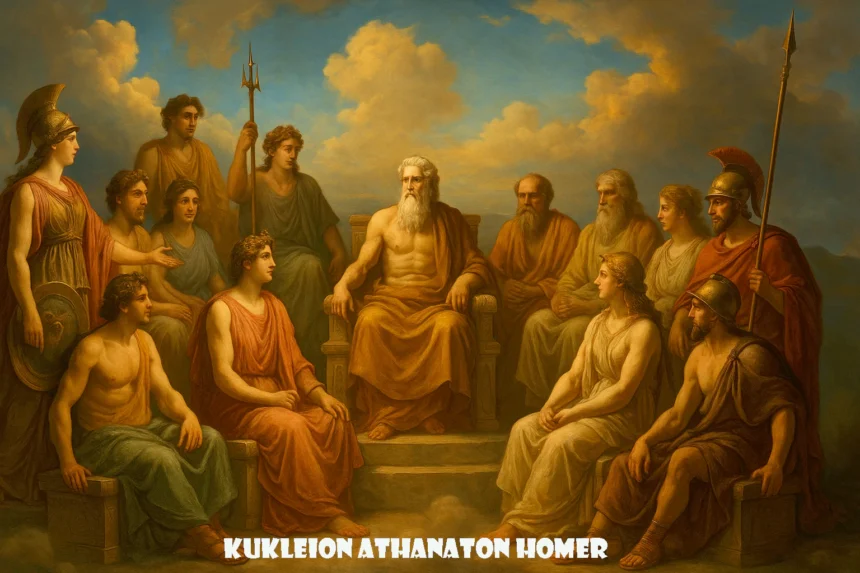The term “Kukleion Athanaton Homer” originates from Ancient Greek and is used in Homer’s epic poetry. It translates as “the circle of the immortals,” referring to the assembly of the Olympian gods.
The poet Homer, considered the father of Western literature, used this phrase in the Iliad and Odyssey to illustrate how gods came together to discuss mortal affairs. These divine councils play a central role in deciding the fate of humans involved in great wars and adventures.
Homer’s storytelling style includes such divine scenes to show that while heroes fight on Earth, decisions are often made in the heavens. The phrase connects the divine realm with the mortal world in a poetic and symbolic way.
This term reflects the religious and literary traditions of ancient Greece, where gods were believed to be closely involved in human lives. Through the phrase, Homer makes readers aware that the gods are not just watching—they’re influencing every major event.
Breaking Down the Phrase: Word-by-Word
Let’s understand the phrase by breaking it into parts. “Kukleion” (Κύκλειον) is derived from the word for “circle” or “ring.” This represents a closed, sacred gathering where each member is equal in presence. In a Homeric context, it means an organized group sitting in a circle, like a council.
The second word, “Athanaton” (Ἀθανάτων), means “of the immortals.” It’s the genitive plural form of “athanatos,” which translates to “immortal.” In Greek mythology, this word refers to the Olympian gods like Zeus, Hera, Apollo, and Athena.
So, when combined, “Kukleion Athanaton” means “the circle of the immortals,” describing a formal meeting of the gods. These councils serve as scenes where divine decisions are made that affect the human world.
This term is more than just poetic. It conveys order, unity, and divine governance in the structure of the universe as perceived by the ancient Greeks.
Role of the Gods in Homer’s Epics
In Homer’s epics, the gods are not passive observers. They are deeply involved in human life. They choose sides, protect certain mortals, and punish others. Their interactions often change the direction of the story.
The gods meet in their heavenly council—the “Kukleion Athanaton Homer”—to discuss important events. These divine assemblies reflect the importance of fate, justice, and divine will in Greek thought. Sometimes they argue. Sometimes they agree. But their decisions are always final.
For example, in the Iliad, Zeus gathers the gods to debate who should win the Trojan War. In the Odyssey, Athena pleads for Odysseus’s return while other gods remain silent or indifferent.
These scenes of divine council show how the gods act like a ruling class or cosmic government, deciding the fates of mortals below.
Symbolism Behind the Phrase
The phrase “Kukleion Athanaton Homer” holds deep symbolic meaning. The circle itself is a symbol of eternity, unity, and balance. When the gods sit in a circle, it suggests equality among them, at least in the structure of the meeting.
The immortals symbolize timelessness and divine power. Their “circle” becomes a sacred court where destinies are determined. It also highlights the gap between the divine and human—gods are eternal and powerful; mortals are short-lived and fragile.
In many Homeric scenes, mortals suffer due to decisions made by this divine circle. The phrase is not just decorative—it reveals the philosophical core of the epics: that humans live in a world ruled by divine will.
Thus, “Kukleion Athanaton” is a symbol of cosmic control, divine hierarchy, and the unseen hand behind epic tragedies and triumphs.
Use in the Iliad
In the Iliad, the gods are almost as active in battle as the soldiers. Homer shows us divine councils where the gods discuss how to influence the Trojan War. This is where the phrase “Kukleion Athanaton Homer” most often appears.
Zeus, as the king of gods, calls for meetings to settle disputes among the Olympians. Some gods support the Greeks (like Athena and Hera), while others support the Trojans (like Apollo and Aphrodite). These councils show how divided the gods are—and how their personal preferences shape mortal outcomes.
In Book 4 of the Iliad, there’s a famous council scene where Zeus tries to restore peace, but it ends in more divine interference. The phrase marks these moments of critical divine decision-making.
The “circle of immortals” here becomes a dramatic stage for divine politics, mirroring the chaos on Earth.
Use in the Odyssey
In the Odyssey, divine councils happen less often but carry great importance. The phrase “Kukleion Athanaton” appears when the gods discuss Odysseus’s fate, especially his return to Ithaca after the Trojan War.
Athena, the goddess of wisdom, argues for Odysseus’s safe return, while Poseidon remains angry with him. Zeus eventually agrees with Athena, showing that decisions made in the divine circle directly influence the hero’s journey.
Unlike the Iliad, where gods are more divided, in the Odyssey, the council scene emphasizes justice and mercy. The “circle of immortals” is portrayed as a place where divine fairness is considered, not just personal rivalry.
These scenes reveal how Homer shifts tone between the two epics, but continues using the phrase to show divine control over human life.
Linguistic and Literary Importance
“Kukleion Athanaton Homer” is not just meaningful—it’s beautifully crafted. Homer’s epics were originally told aloud by bards, so certain phrases were repeated for rhythm and memory. These are called formulaic expressions.
This phrase fits into dactylic hexameter, the poetic meter Homer used. Its rhythm and sound make it easy to remember and pleasing to hear.
These recurring phrases helped maintain structure in long oral performances. But they also added grandeur and tradition to the storytelling.
Thus, linguistically, “Kukleion Athanaton Homer” serves both artistic and functional roles in Homer’s epics.
Philosophical and Cultural Reflections
The concept behind “Kukleion Athanaton Homer” reflects deep Greek ideas about fate, power, and divine justice. Ancient Greeks believed that gods were real beings who had control over nature and human destiny.
This divine circle shows that even the gods have to meet and debate, hinting at order in the universe. Yet, because the gods also behave emotionally and play favorites, Homer shows us that the divine world is not perfect.
The phrase reminds us of the delicate balance between human free will and divine intervention. Mortals make choices, but gods often decide the consequences.
It’s a rich concept that blends religion, philosophy, and literature into one poetic image.
Modern Interpretations and Influence
Modern scholars still study this phrase for what it reveals about Greek culture, religion, and literary techniques. The idea of a “divine council” has influenced countless works.
Writers like Virgil, Dante, and Milton created similar councils in their epics. In Milton’s Paradise Lost, God and the angels hold meetings about humanity—an idea drawn directly from Homer’s model.
Even today, in movies, books, and mythology-based fiction, scenes with gods gathering to make decisions reflect the legacy of “Kukleion Athanaton Homer.”
This phrase has survived through centuries because it connects us to one of humanity’s earliest visions of cosmic power.
Conclusion
The phrase “Kukleion Athanaton Homer” may be just a few words, but it carries a world of meaning. It shows us how the ancient Greeks imagined their gods—not just as powerful beings, but as a council deciding the fate of heroes.
Homer used this phrase to give divine weight to his stories. It makes the narrative feel larger than life, connected to a higher order.
Even today, this “circle of the immortals” remains a symbol of divine mystery, epic drama, and the poetic genius of Homer.
Also Read:
Ximena Brittan Gunusen: Why Personalized Learning Matters More Than Ever
Burda at Ivy Tech Valparaiso: Real People Shaping the Future of Community Education
Use 1.5f8-p1uzt for Next-Gen Texture Compression: Save Space Without Losing Detail
Donkshakers Breakdown: What Makes a Donk Ride Truly Unique?
janell kochevar with element 3: Where Marketing Meets Mission-Driven Communication









